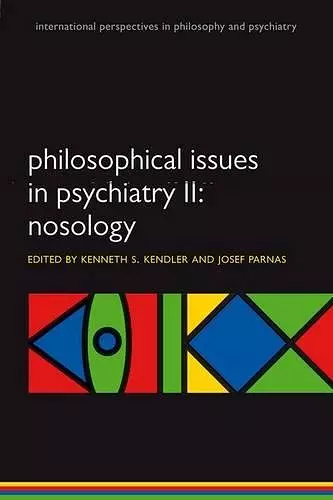Philosophical Issues in Psychiatry II
Nosology
Kenneth S Kendler editor Josef Parnas editor
Format:Paperback
Publisher:Oxford University Press
Published:19th Apr '12
Currently unavailable, and unfortunately no date known when it will be back

Psychiatric and psychological practice and research is critically dependent on diagnosis. Yet the nature of psychiatric diagnosis and the rules by which disorders should be created and organized have been highly controversial for over 100 years. Unlike simple medical disorders (like infectious diseases), psychiatric disorders cannot be traced to one simple etiologic agent. The last two generations have seen major conceptual shifts in the approach to diagnosis with the rise of operationalized criteria and an emphasis on a descriptive rather than etiological approach to diagnosis. The interest in psychiatric diagnoses is particularly heightened now because both of the major psychiatric classifications in the world - DSM and ICD - are now undergoing major revisions. What makes psychiatric nosology so interesting is that it sits at the intersection of philosophy, empirical psychiatric/psychological research, measurement theory, historical tradition and policy. This makes the field fertile for a conceptual analysis. This book brings together established experts in the wide range of disciplines that have an interest in psychiatric nosology. The contributors include philosophers, psychologists, psychiatrists, historians and representatives of the efforts of DSM-III, DSM-IV and DSM-V. Some of the questions addressed include i) what is the nature of psychiatric illness? Can it be clearly defined and if so how? ii) What is the impact of facts versus values in psychiatric classification? iii) How have concepts of psychiatric diagnosis changed over time? iv) How can we best conceptualize the central idea of diagnostic validity? And v) Can psychiatric classification be a cumulative enterprise seeking improvements at each iteration of the diagnostic manual? Each individual chapter is introduced by the editors and is followed by a commentary, resulting in a dynamic discussion about the nature of psychiatric disorders. This book will be valuable for psychiatrists, psychologists and other mental health trainees and professionals with an interest in the questions and problems of psychiatric diagnosis, as well as philosophers and philosophy students interested in the problems posed by psychiatry, particularly those working in the philosophy of science.
The quality of writing and argument is uniformly excellent and the style is engaging. * BJPsych, Jan 2013 *
This book addresses many fundamental issues regarding psychiatry and psychiatric diagnoses as well as the future of psychiatry. It is important reading for anyone in the field. * Doody's Reviews *
This book sets out to offer a comprehensive analysis of the concepts that we use to validate our diagnostic categories and succeeds admirably in this aim. It is important that clinicians are aware of the strengths and weaknesses of our diagnostic concepts. This book should be essential reading for all psychiatrists. * The British Journal of Psychiatry, Jan 2013 *
In March of this year, this book became even more relevant to those interested in psychiatric classification. The American Psychiatric Association Board of Trustees formed a DSM Steering Committee to make decisions about future changes in the DSM. Further, it was decided that the Steering Committee would use a concept of validators in accepting changes to DSM-5. Those proposing changes for DSM-5.1 will be wil advised to understand the concept of validators as described in this book... DSM-5 resolved none of the tensions that this book explicates so well. Those wanting a deep understanding of the tensions in psychiatric classification will gain much from this volume, an understanding that hopefully someone or some team will use to get psychiatric classification unstuck. * Journal of Clinical Psychiatry *
ISBN: 9780199642205
Dimensions: 233mm x 155mm x 20mm
Weight: 540g
360 pages